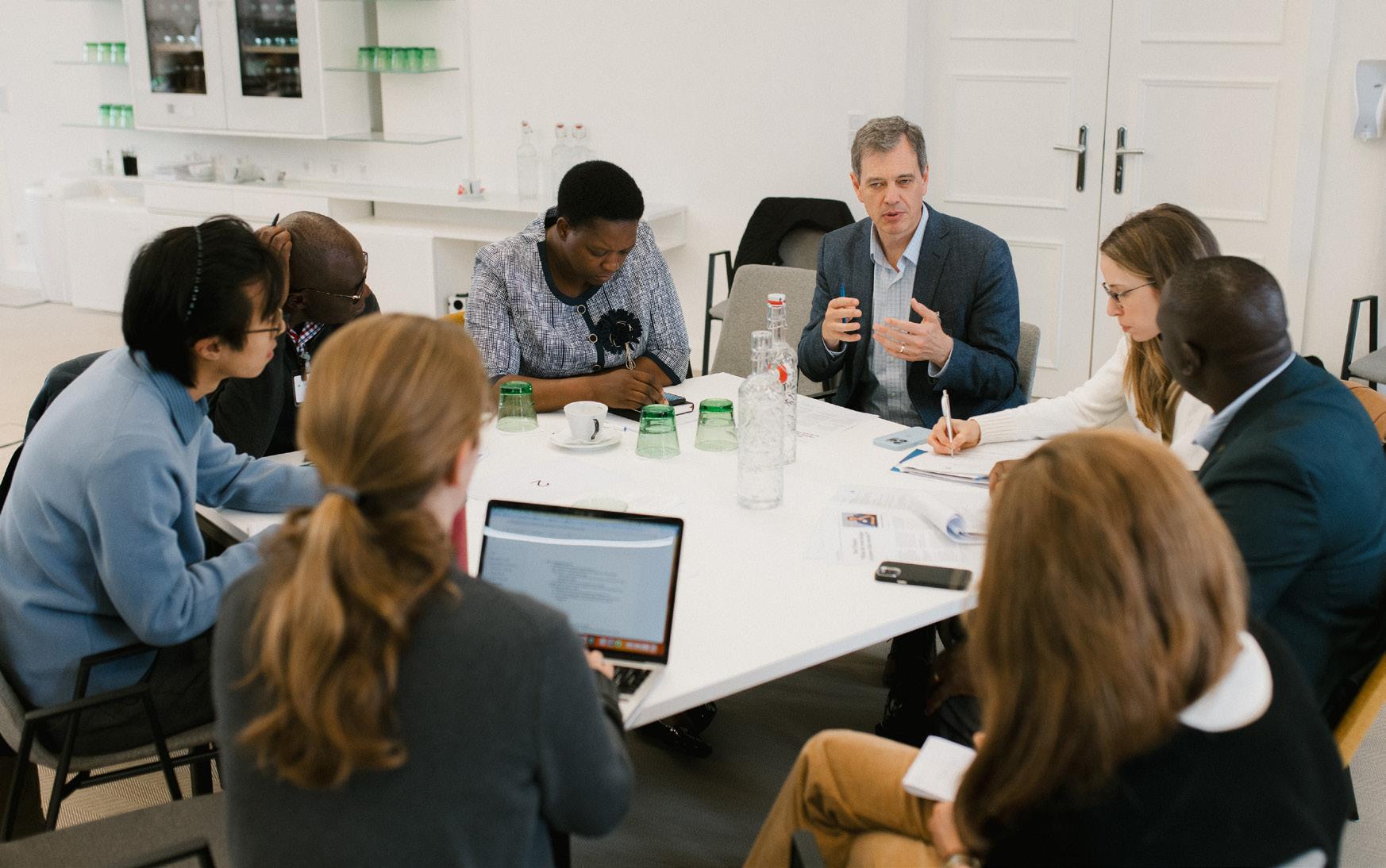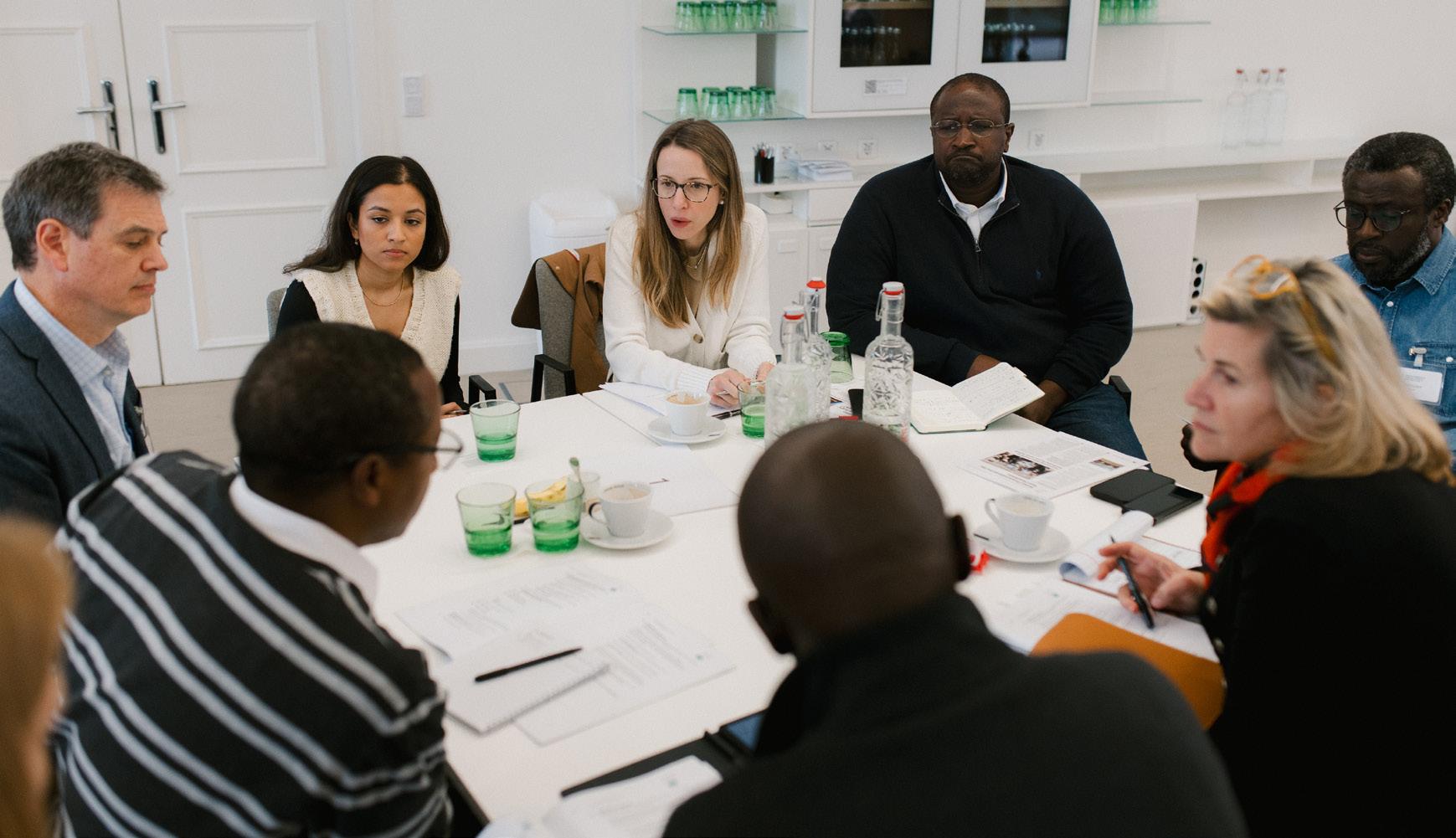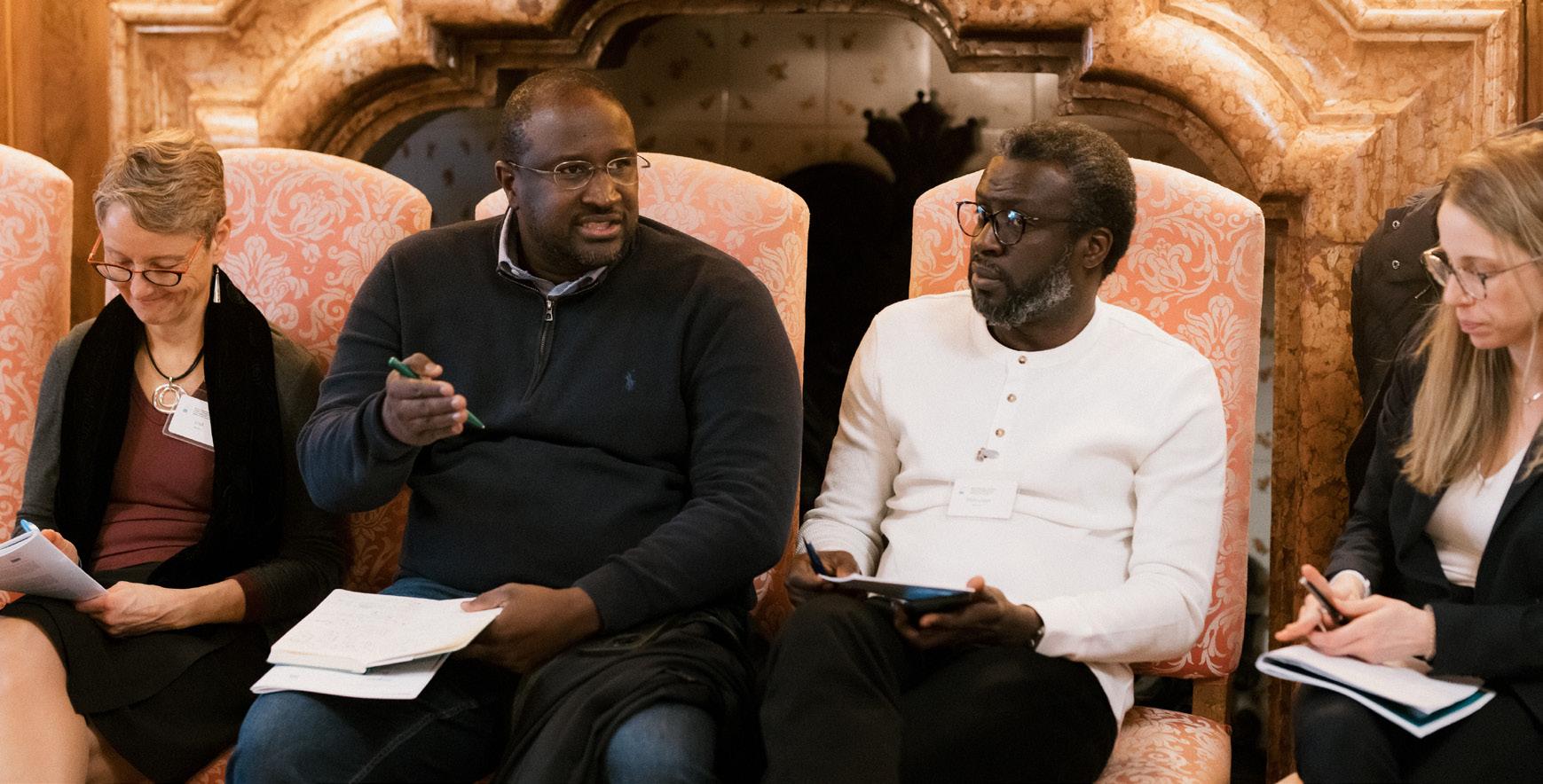





Date: March 11 - 16, 2024
Location: Schloss Leopoldskron, Salzburg, Austria
Salzburg Global Program Staff:
John Lotherington, Program Director
Valeriia Chernysh, Program Associate
Sara Jeanty, Program Intern
Report Authors:
Anaïse Boucher-Browning, Great Issues Fellow, Dickey Center
Dawn Carey, Associate Director for Global Health and Development, Dickey Center
Kendall Hoyt, Faculty Director for the Pandemic Security Project, Dickey Center
Manasi Singh, Global Health Intern, Dickey Center
All four report authors attended the program in Salzburg, as did Dartmouth’s Lisa Adams and Victoria Holt.
In April 2022, Dartmouth College’s John Sloan Dickey Center for International Understanding launched the Pandemic Security Project to explore and analyze the lessons that surfaced during the global response to the COVID-19 pandemic.
The two-year initiative has endeavored to review lessons learned from the COVID-19 pandemic and convene Dartmouth, domestic, and international experts in economics, biosecurity, and epidemiology to study the global effects of pandemics, the origins of COVID-19, analyze our preparedness, and suggest ways to prevent the next epidemic.
The Dickey Center selected Kendall Hoyt as the faculty director for the Pandemic Security Project. She is also an assistant professor at the Geisel School of Medicine at Dartmouth and a senior lecturer at the Thayer School of Engineering at Dartmouth.
The initiative has followed an ever-widening scope of influence and effect, expanding from the local and academic view to the national impacts and successes and finally to the international stage of disease burden and innovation.
It was apparent that a particular issue was vaccine access in low- and middle-income countries (LMICs), and the world needed to be better prepared to face a future pandemic. That preparation, in turn, needed to be far more closely grounded in the experience and insights of decision-takers and frontline leaders from LMICs. Amplifying the pandemic perspectives of LMICS is vital in shaping prevention models while concurrently strengthening health care systems.
Salzburg Global Seminar has always promoted cross-border exchanges in a range of public policy and international relations domains, not least in its work on equitable and effective health policy. It’s an organization to which Dartmouth College has had a longstanding connection.
In 1999, a group gathered to create two programs in Hanover, New Hampshire, focused on “Globalization and the University,” culminating in a white paper shared internationally as the groundwork for the larger academic community conversation.
A decade later, the Dartmouth Center for Health Care Delivery Science partnered with Salzburg Global for a five-session series over as many years to animate dialogue over health innovation that benefits populations and conditions historically underserved around the world, specifically around patient empowerment. This notably developed from the pivotal Salzburg Statement on Shared Decision Making, published in the British Medical Journal in 2011.
With this in mind, it was ideal that Dartmouth’s Pandemic Security Project and Salzburg Global join forces to work on vaccine access. To sharpen the focus and enhance the possibilities of collaboration, it was decided that a joint five-day program in Salzburg should bring together health sector leaders from across the African continent to illuminate the key issues in dialogue with representatives of international organizations, thinkers, and activists.
Salzburg Global’s program, “Better Preparedness for the Next Pandemic: Developing Vaccine Access Models with Low- and Middle-Income Countries,” brought together a group of senior representatives of international health ministries, heads of procurement, policymakers, researchers, and health care specialists from the African continent and beyond to create a better plan for the next pandemic. The group convened in Salzburg in mid-March 2024, exactly four years after the World Health Organization (WHO) declared COVID-19 a pandemic.
This program covered issues of equitable access across the medical countermeasure (MCM) value chain, which spans the entire process of research and development, clinical trials, manufacturing, procurement, distribution, and delivery. Of particular focus was the importance of shifting the locus of decision-making from global levels to regional, national, and local levels. The foundational themes discussed were political accountability, collaboration, leverage, adaptability, and self-determination.
During the program, participants convened to draft a framework for synthesizing the week’s conversations. The group identified certain activities that are better managed on the state and local levels. These include community engagement, vaccine hesitancy, distribution, and disease surveillance. The group also identified activities that benefit from the leverage that more collective approaches afford, such as pooled procurement. This draft framework (see Appendix) informed the organization and content of the program proceedings.


“Pandemics start and end with communities.”
The participants raised community engagement as an essential component of national pandemic preparedness. Conversations around vaccine hesitancy and countering misinformation led to the idea of “infodemic preparedness,” which involves mapping trusted sources and sources of misinformation. Participants also noted that engaging community leaders to promote vaccine acceptance can be complex, but involving community leaders earlier in the planning phases of vaccine programs could increase their support in combating vaccine hesitancy.
Participants also discussed the role of local community health workers who are involved in pathogen identification and surveillance, vaccine uptake, and building community trust. Some participants voiced how input from community health workers can contribute to locally informed and culturally appropriate pandemic preparedness and response. For example, local health care workers could help understand local realities and preferences for factors such as the number of doses per vial, storage capacity and temperature, and community outreach challenges.
Integrating national pandemic response strategies into existing health and security planning was a recurring theme of analysis.
One participant highlighted how improving risk assessments can allow for quick adaptability in real-time by accounting for potential scenarios such as new pathogens, climate change, and the movement of people.
Another important theme was how integrated data systems can inform pandemic preparedness and response through capacity building and strengthening linkages between national and regional data systems. Expanded disease surveillance and testing capabilities inform resource prioritization but require national and regional capacity building to address a wider range of diseases and to perform data modeling to anticipate outbreak trends.
National Vaccination Deployment Plans offer a chance to integrate emergency pandemic response campaigns with routine health care delivery, when possible, to avoid fragmentation and disruption of care.
Multiple participants highlighted the advantages of incentivizing pathogen sharing and the importance of not penalizing countries for doing so, citing the case when South Africa shared the discovery of the Omicron variant of SARS-CoV2. Some participants also mentioned the need for broader national pharmacovigilance programs with integrated data systems that can identify and respond to adverse side effects from medical countermeasures (MCMs).
“National health care is the staff, stuff, space, and systems...”
An investment in primary and community health care is an investment in pandemic preparedness. Participants discussed how utilizing the existing health human resources for pandemic response involves mobilization plans, proactive training, and addressing burnout. The interpandemic period can be a time for upskilling, resourcing, and capacitating healthcare workers.
Conversations focused on interpandemic evaluation, strengthening, and financing of national health care infrastructure and systems for MCM distribution, including dose packaging, storage capacity and conditions, and strategies for reaching populations. Some participants discussed adult vaccination clinics as one way to invest in everyday health needs and bolster outbreak response capabilities.

“Geography matters. We must diversify supply.”
Multiple African leaders spoke about the benefits of building capacity for additional nodes of regional medical countermeasure (MCM) development and manufacturing to help both specific local markets and the global community by increasing the supply of MCMs to mitigate issues such as vaccine nationalism and export bans.
Participants noted the opportunity to address local endemic diseases and vaccine development as part of pandemic preparedness. For instance, dengue outbreaks cause a large burden on local healthcare systems and have the potential to become an epidemic.
Institutional structures for co-ordinating African regional MCM development and manufacturing are also important to consider. Participants addressed the need for transnational strategy co-ordination, data sharing, partnerships, regulation, and scalability.
One participant explained how an ecosystem approach could allow for aggregating continent-wide demand and establishing a regional supply chain of MCM input materials and related products. Participants outlined challenges for regional MCM development and manufacturing, including tech transfers, inspection capacity, prequalification, supply chains, and workforce training.
Some participants suggested that regional MCM manufacturing could be bolstered by regional procurement for both routine and some outbreak MCMs. This approach would offer predictable demand and preferential procurement from African producers. Multiple participants noted that the pandemic accord currently under negotiation presents an opportunity for governments to commit to investing in the development, manufacturing, and purchasing of MCMs.
Planning for equitable access to medical countermeasures (MCMs) begins at the research and development stages. One participant noted that efforts to negotiate access agreements with developers during the research and development phases can be more effective than attempting to secure access provisions contractually after an MCM has been developed.
Regional MCM manufacturing could present an opportunity to increase negotiating leverage during the procurement process by producing components that contribute to MCMs and prioritizing collaboration with regional manufacturers. Regional manufacturing could also have a comparative advantage in producing MCMs for endemic diseases.

The interpandemic period is an important time to consider the financial, legal, and regulatory structures that will enable a fast and equitable pandemic response. This includes developing access to day zero at-risk financing, a vaccine clearinghouse for sharing, allocation decision mechanisms, and clinical trial protocols.
Many participants emphasized that sustaining pandemic preparedness requires regular communication and collaboration among decision-makers. There is also a need to maintain attention on ongoing epidemics and pandemics that require similarly urgent responses.
Early group discussions found pooled procurement mechanisms to have strong potential. Pooled procurement involves a third party procuring on behalf of multiple buyers, aggregating demand to give buyers market power. Pooled procurement offers benefits such as increased speed and scale, leverage for price and product choice, information and risk-sharing, and incentivizing more developers.
Incorporating ongoing national engagement into global pooled procurement governance was important to participants and grounded many discussions. During the COVID-19 pandemic, low- and middle-income countries (LMICs) struggled to manage vaccine donations that were either about to expire or that strained limited storage capacity. Delayed access to vaccines had the effect of reducing public demand by lowering the perceived risk of disease.
Participants shared that selecting a portfolio of candidates poses challenges, such as defining the target product profile (TPP) and preferred product characteristics (PPC). Participants discussed how global pooled procurement mechanisms could include a purchasing option for LMICs, thus allowing them to shape demand for individual medical countermeasures (MCMs).
Participants agreed that ensuring day-zero financing for pooled procurement could address barriers to timely access to MCMs. Financing mechanisms, such as endowment funds or large global contingency funds, were discussed. Participants also brainstormed a tiered pricing system for global MCM procurement based on country income in which high-income countries would participate.
Participants highlighted the need for regional mechanisms to complement global pooled procurement for equitable access to MCMs. They discussed how regional pooled procurement models could prioritize member-state engagement, coordination, decision-making, and feedback. This approach, seen as part of a multilane procurement strategy, aims to promote equity, resilience, and self-determination alongside global partnerships. Participants emphasized the importance of identifying strategic advantages and additional regional capacity needed for operationalizing regional pooled procurement.
Regional collaboration in Africa requires collaboration among institutions, such as the Africa CDC, the African Epidemics Fund, the African Medicines Agency, the African Risk Capacity, and the African Union. These organizations can play a critical role in facilitating a fast response to outbreaks and emergencies, leveraging their regional presence and expertise. However, African participants shared that strengthening regional pandemic preparedness requires addressing institutional gaps in technical, financing, procurement, and regulatory processes.
Participants emphasized that investing in regional health preparedness is vital not only for health outcomes but also aligns with economic growth and development agendas. Regional institutions have the potential to promote self-determination and ensure donors align with African priorities. Linking regional health organizations for collaboration and promoting peer sharing of best practices can strengthen health systems across the continent.
One proposed model for regional co-ordination is to establish a control tower to integrate disease surveillance and procurement decisions. Key considerations include disease surveillance for resource prioritization, vaccine evaluation, demand forecasting, and delivery systems.

Participants stressed the need for continued domestic and international support to sustain and strengthen regional disease surveillance systems developed during the COVID-19 pandemic, addressing challenges like machine maintenance, expanding disease sequencing capabilities, and access issues with genomics and diagnostics companies.
Another possible framework for regional collaboration discussed by the group is the concept of a “regional fire brigade” for pandemic response that mimics a NATO (North Atlantic Treaty Organization) model. This regional partnership could facilitate commitments, linkages, and co-ordination.
Opportunities for bilateral development agreements, nicknamed the “Intercontinental Buddy System,” were also discussed. In this approach, an African country would find a partner country (perhaps with state-run MCM manufacturing facilities on another continent) that shares common MCM development needs. Bilateral product development partnerships could build agreements to transfer technology and intellectual property and share expertise. This would help build local manufacturing and human capacity while distributing risk should one facility or candidate fail. These partnerships could formally ensure that locally manufactured products are accepted by partner countries while also ensuring the local availability of MCMs produced by partners.


“How can access become the path of least resistance?”
Participants focused on governance architectures and decision-making systems, emphasizing negotiations to mitigate the risk of vaccine nationalism, vaccine hesitancy, political changes, and global procurement shifts. They suggested preparing model contracts to address issues like indemnity, liability, and clauses that guarantee access to the product.
For example, countries could pre-negotiate standard agreements to facilitate negotiations in an emergency. Participants noted that negotiating model contracts does not merely reduce negotiating time in an emergency but provides a concrete opportunity to establish expectations and norms for standards of behavior in an emergency.
Formalizing partnerships and equitable access agreements in research and development funding agreements can promote affordability, availability, and sustainability. Model contracts could include enforceable details on supply components, intellectual property, pricing principles, data publication, and technology transfer. Humanitarian or global health licenses can allow for intellectual property transfer if a company fails.
While fully pre-drafting contracts is challenging due to shifting specifics (i.e., countries, manufacturers, products, and timelines), having model agreements can provide a firmer basis for negotiations during pandemic responses. African leaders stressed the need for building negotiation capacity, as LMIC Ministries of Health often lacked the legal teams available to manufacturers, pooled procurement organizations, and donors during the COVID-19 emergency. Business intermediaries and multilateral banks often negotiated contracts on behalf of LMICs in exchange for significant commissions.
Country Regional Level (AU) Global Agency
1 Surveillance Done at national level (IDSR) Reporting Reporting
Cross border surveillance system
2 Basic Science Done at national level
(There are many activities going on with member states) Done at regional level / research networks
NB: Need to strengthen capacity of reference laboratory Done at global level
3 Vaccine Development Done at national level (Vaccine Discovery Department) Promote regional vaccine manufacturing, co-ordination, and collaboration/ partnerships
4 Choosing Technology/Product Country decision
5 Procurement and Contracting National procurement: used when there is a very competitive market or there is a manufacturer located within the country
at global level
Regional (pooled) procurement: for the economies of scale, used to procure routine vaccines for Gavi-graduated or never-Gavi countries to maintain some leverage
Global procurement: used for continued procurement of routine vaccines for Gavi countries 6 Financing Domestic Done at regional level International 7 Pharmacovigilance Done at national (sovereign) authorities
8 Manufacturing
be developed regionally